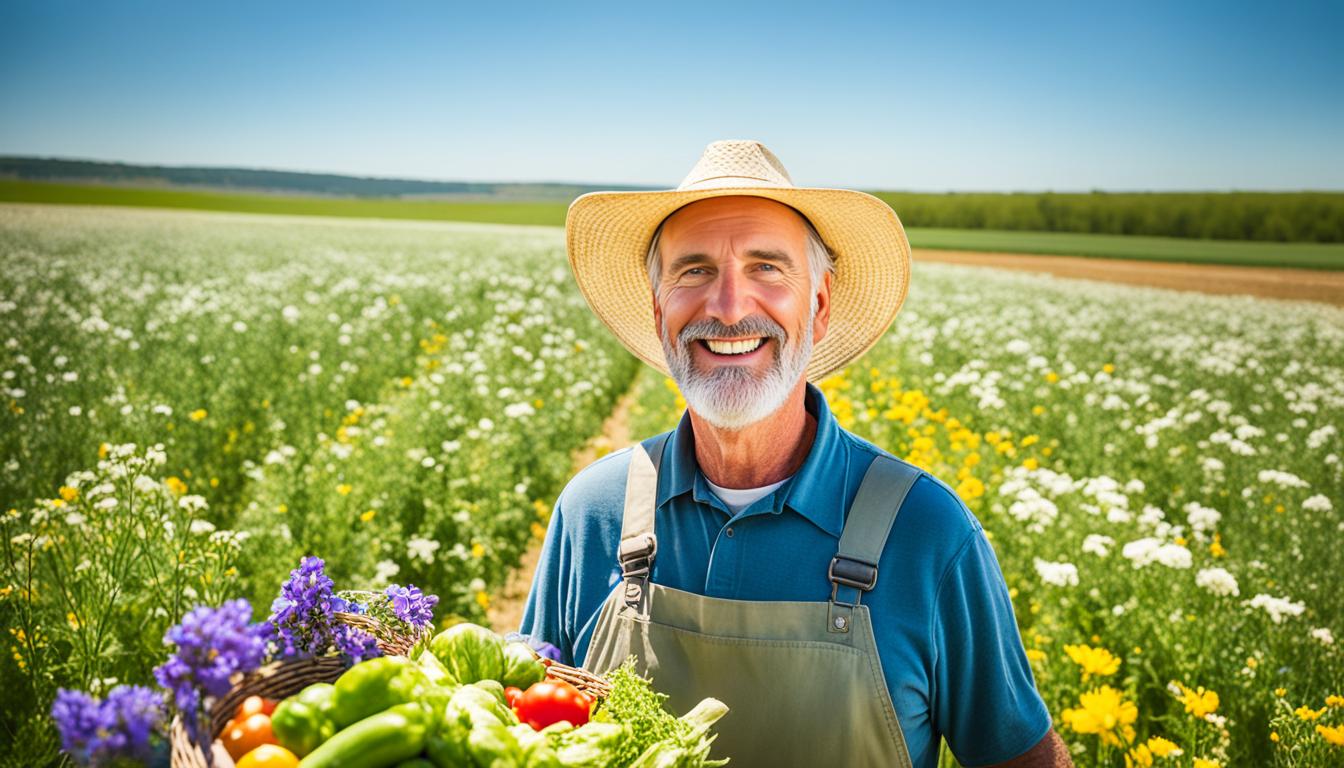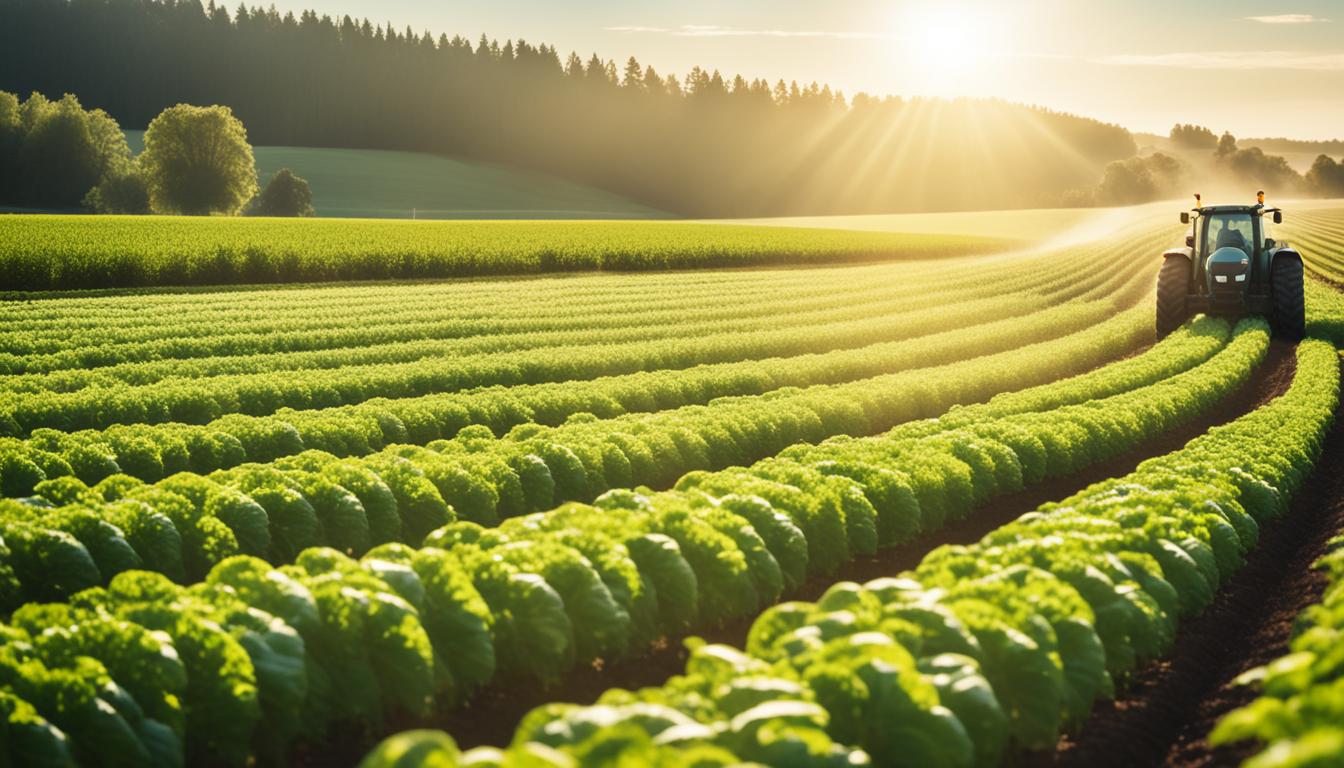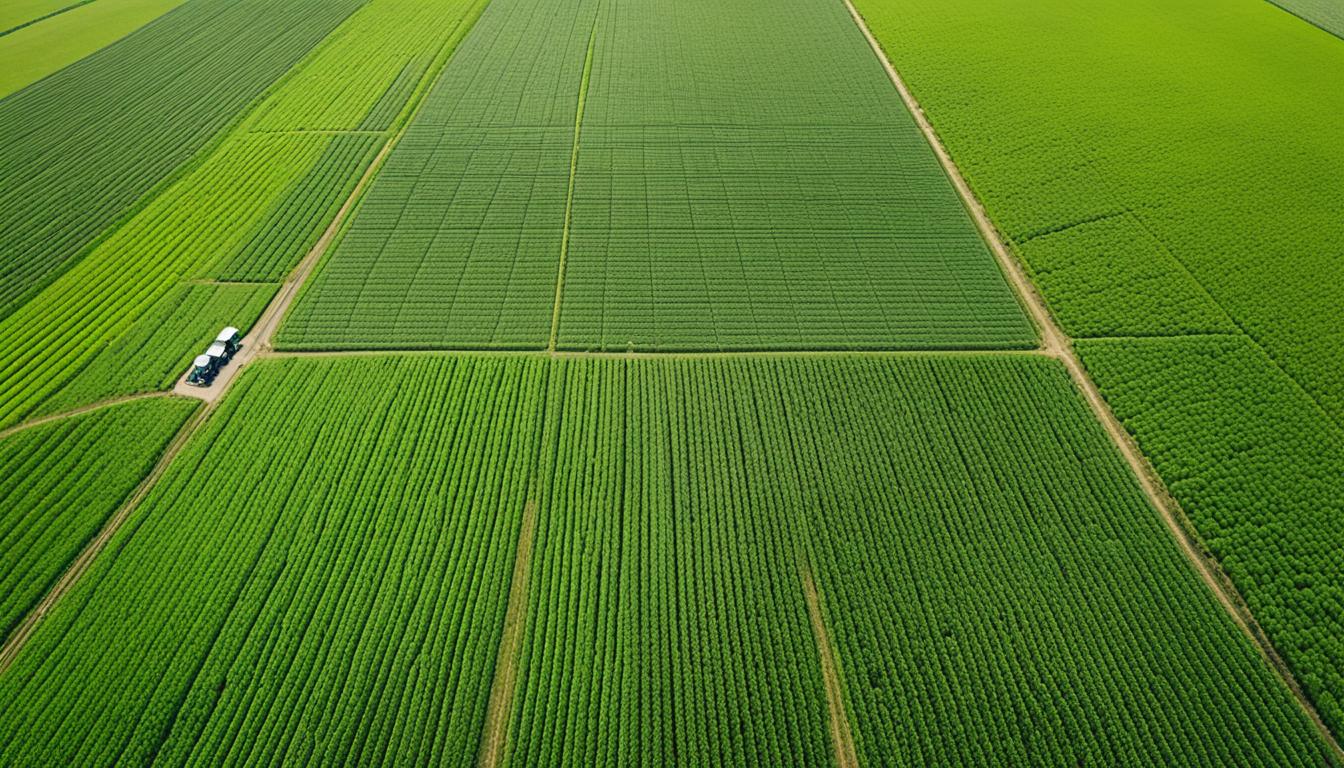As a farmer, you can choose a sustainable and eco-friendly way to farm – organic farming. Switching to organic farming brings many benefits. It helps your farm and the planet.
Imagine growing crops without synthetic chemicals. This means healthier soil and more organic produce for people who want it. Organic farming is a great choice for farmers.
Organic farming is all about making the soil healthy and protecting nature. It means using fewer synthetic fertilizers and pesticides. This keeps your land healthy and makes your farm stand out in the organic market.
This article will show you the many advantages of organic farming. You’ll learn how it can make your farm more profitable and protect the soil for the future. We’ll see why farmers are turning to organic farming and how you can too.
Embrace Nature’s Bounty: Why Should Farmers Switch to Organic Farming
More farmers are moving to organic farming as demand for organic produce grows. This shift helps improve soil health and cuts down on synthetic chemicals. It’s a sustainable choice that’s good for the planet and can make farmers more money.
Understand the Growing Demand for Organic Produce
The organic food market is booming, with sales hitting $55 billion in the U.S. in 2020. This shows how much people want healthier, eco-friendly food options.
Switching to organic farming lets you meet this demand. You can grow crops that are free from pesticides and full of nutrients. This can lead to higher prices and more profit for your farm.
Explore the Long-Term Benefits of Sustainable Practices
- Improved soil health: Organic farming uses crop rotation and natural fertilizers to make soil better. This makes your land more fertile and sustainable for the future.
- Reduced chemical footprint: Organic farming means less use of harmful chemicals. This protects the environment, helps biodiversity, and keeps ecosystems healthy.
- Increased profitability: Organic products sell for more money. This lets you make the most of the growing demand for sustainable produce.
Thinking about going organic? Consider the big benefits it brings. It can make your farm more successful and eco-friendly for years to come.
Safeguarding Soil Health: The Foundation of Organic Farming
In sustainable agriculture, soil health is key. Organic farming is more than just growing crops. It’s about taking care of the soil that supports everything. Using natural fertilizers and pesticides helps keep the soil healthy for a long time.
Organic farming uses methods like crop rotation and composting. These help the soil stay rich and full of life. They also keep the good bugs and worms that are vital for a healthy soil ecosystem.
- Enhance soil organic matter through the application of natural fertilizers like compost and manure.
- Implement crop rotation to prevent nutrient depletion and minimize the risk of pest infestations.
- Avoid the use of synthetic chemicals, which can disrupt the natural balance of the soil and harm beneficial organisms.
Choosing sustainable farming helps protect your soil and the environment. This way, you get healthy crops and keep your farm going strong. It’s a way to be responsible and leave a good legacy for the future.
“The health of soil, plant, animal, and man is one and indivisible.” – Lady Eve Balfour
Nutrient-Rich Crops: Enhancing Flavor and Quality
Organic farming brings out the best in your produce, making it flavorful and packed with nutrients. It uses nature’s gifts to meet the needs of those who choose organic foods. These customers are willing to pay more for products that are good for their health and the planet.
Unleash the True Potential of Your Produce
Organic farming focuses on keeping the soil healthy and managing pests naturally. This lets your crops grow strong and full of life. The result is nutrient-rich food that tastes better. Your customers will love the real flavors of your organic fruits and veggies.
Cater to Health-Conscious Consumers
- Organic crops don’t have synthetic pesticides or fertilizers, making them a better choice for those who care about health.
- By focusing on organic farming benefits, you can attract customers who value wellness and the environment.
- Your premium pricing for organic products shows the quality and value of your sustainable farming. It rewards your hard work in caring for the earth.
| Nutrient Comparison | Organic | Conventional |
|---|---|---|
| Vitamin C | 27% higher | 18% lower |
| Antioxidants | 69% higher | 20% lower |
| Nitrates | 15% lower | 18% higher |
“Organic farming is not just about producing food – it’s about nourishing the land and nurturing the health of our communities.”
Reducing Environmental Impact: A Greener Way Forward
Using sustainable agriculture practices is key to a greener future. By cutting down on synthetic chemicals, organic farmers can lessen their environmental impact. This helps keep our ecosystems in balance.
Minimize Reliance on Synthetic Chemicals
Traditional farming often uses a lot of synthetic pesticides and fertilizers. These can harm the environment. Organic farming uses natural, safe alternatives instead.
This method protects the soil and water. It also helps beneficial insects and wildlife, keeping the ecosystem healthy.
Preserve Biodiversity and Ecological Balance
Organic farming grows many plant types and protects natural habitats. It avoids broad-spectrum chemicals. This lets a variety of organisms, like pollinators, thrive.
This keeps the food web balanced. It ensures the land and its resources stay sustainable for the future.
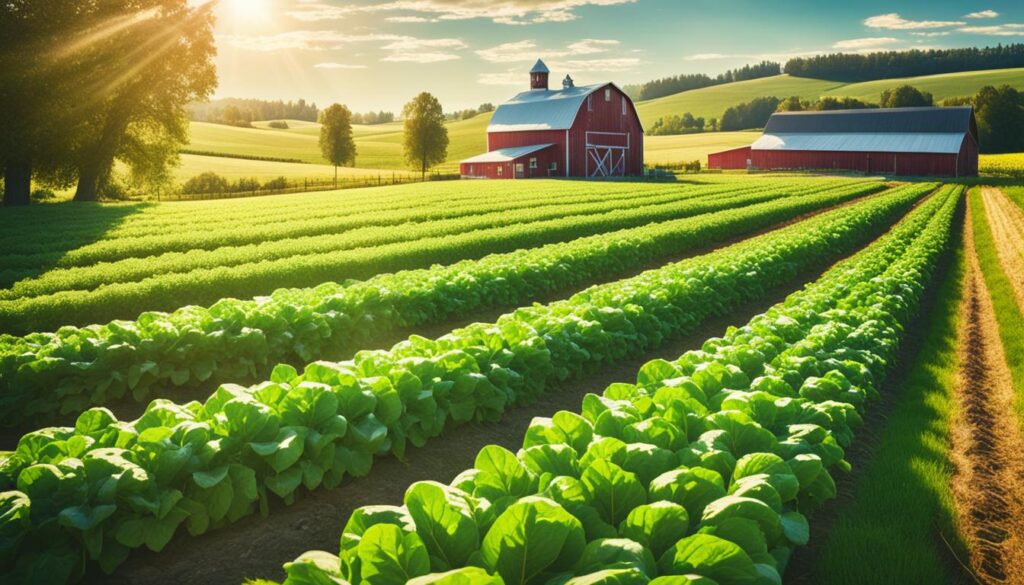
“Organic farming is not just about growing food – it’s about nurturing the land and preserving the natural harmony of our planet.”
Organic farming is vital for reducing agriculture’s environmental impact. It shows the power of sustainable practices and preserving nature. This approach is key to a sustainable future.
Premium Pricing: Reaping the Rewards of Organic Farming
As a farmer, you’ve likely seen more people want organic produce. This trend means a big chance to make more money. By using organic farming, you can sell your crops for more because they are high-quality and full of nutrients.
Organic farming is good for the planet and for people. Organic crops have more nutrients than regular crops. This means you can charge more for your organic food. It’s a way to make more money from your hard work.
| Organic Farming Benefits | Conventional Farming |
|---|---|
| Higher Nutrient Content | Lower Nutrient Content |
| Premium Pricing | Standard Pricing |
| Increased Profit Margins | Narrower Profit Margins |
By meeting the demand for organic food, you can make your farm stand out. You can charge more for your organic products. This helps your farm’s finances and supports your green farming goals.
The path to success in organic farming is about more than money. It’s about making a better future for everyone. By offering great organic food, you help your community and grow your farm in a good way.
Building a Sustainable Legacy: Organic Farming for Future Generations
As a farmer, your choices today shape the future. By choosing sustainable agriculture practices and environmentally friendly farming methods, you help your community and the planet. This way, you create a lasting legacy.
Organic farming is a key to a sustainable future. It protects the land and its resources for the future. By using crop rotation, cover cropping, and smart water use, you improve soil health, increase biodiversity, and cut down on carbon emissions.
“Sustainable farming is not just about the here and now – it’s about creating a brighter future for our children and grandchildren.”
Using fewer synthetic chemicals and choosing renewable inputs keeps the land and ecosystem healthy. This means your farm can keep thriving. You can pass on a successful farm to your family.
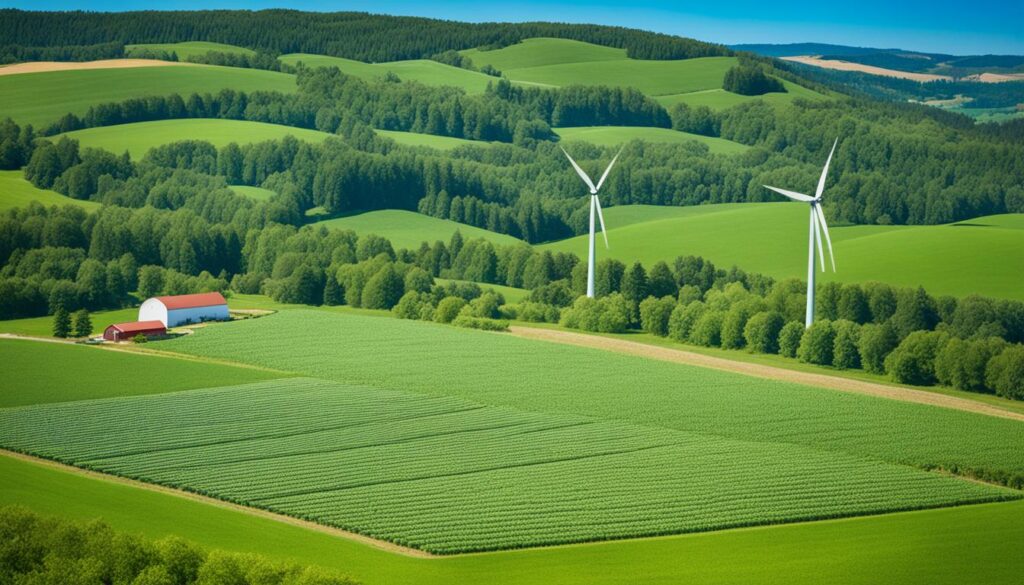
There’s also a growing market for organic produce. Health-conscious people want food that’s good for them and grown naturally. By meeting this demand, you can make a steady income and secure your family’s future.
Choosing organic farming is a smart move. It’s an investment in your land and community’s future. By using sustainable agriculture practices, you ensure your farm will continue to do well for many generations.
Crop Rotation: A Time-Honored Technique for Soil Rejuvenation
Crop rotation is key in sustainable farming. It means changing the crops in a field over time. This method boosts soil health and uses nutrients better. By growing different crops, farmers use natural helpers and keep the soil healthy for a long time.
Maximize Nutrient Utilization and Minimize Pest Infestations
Crop rotation makes the most of the land. By switching between legumes, grains, and vegetables, the soil gets more nutrients. This cuts down on synthetic fertilizers and supports sustainable agriculture practices. Also, different crops stop pests from spreading, reducing the need for harmful natural fertilizers and pesticides.
| Crop Rotation Benefits | Explanation |
|---|---|
| Improved Soil Health | Crop rotation replenishes nutrients, keeps soil structure right, and stops erosion. This keeps the soil healthy for a long time. |
| Pest and Weed Control | Changing crops breaks up pests and weeds’ homes, cutting down on chemical use. |
| Increased Yields | With better nutrients and fewer pests, crops grow better and produce more. |
Using crop rotation is key to a sustainable farm. It uses the land’s natural benefits to improve farming. This way, farmers can make the most of their land and keep the soil healthy for future generations.
Harnessing Nature’s Defenses: Organic Pest Control Methods
Organic pest control is a key to sustainable farming. It uses beneficial insects and natural predators. Farmers can also use plant-based repellents to keep pests away without harming the environment.
Embrace Beneficial Insects and Natural Predators
Organic farming helps beneficial insects and natural predators thrive. These include ladybugs, lacewings, and praying mantises. They keep pests like aphids and caterpillars under control without harsh chemicals.
Explore Plant-Based Repellents and Deterrents
Organic farmers also use plants to fight pests. Herbs like lavender and peppermint keep insects away. Natural oils and extracts, such as neem oil, are safe pesticides.
These methods protect crops and soil. They also help the environment. Plus, they give consumers chemical-free food.
Organic Fertilizers: Nurturing Soil and Plant Health
In organic farming, using natural fertilizers is key to success. These fertilizers keep your crops healthy and your soil fertile for the long term. Let’s look at compost and manure and how they help your organic farm.
Unlock the Power of Compost and Manure
Compost and manure are top choices for organic farmers. They’re full of nutrients like nitrogen, phosphorus, and potassium. These nutrients are vital for plants to grow strong and healthy. Adding compost and manure to your soil keeps your crops healthy year after year.
These materials also make your soil healthier and stronger. They help keep soil moist, improve air flow, and support good microorganisms. This creates a strong soil ecosystem that supports many plants and organisms in a healthy farm.
| Organic Fertilizer | Key Benefits | Nutrient Composition |
|---|---|---|
| Compost |
|
|
| Manure |
|
|
Using compost and manure as organic fertilizers is a big step towards keeping your farm sustainable. These natural materials feed your plants and make your land healthy. They help create a farm that’s productive, healthy, and good for the environment.
Water Conservation: A Crucial Aspect of Sustainable Farming
As a farmer, you know how vital water conservation is. With water getting scarce and the push for green farming, saving water is key. Using water-saving methods can greatly improve your farm.
Drip irrigation is a smart choice. It sends water straight to the roots, cutting down on waste and evaporation. This way, you use water better and make sure your plants get just the right amount.
Adding drought-resistant crops is another smart move. These plants can survive with less water, making your farm more efficient. By choosing these crops, you use less water and still meet your customers’ needs.
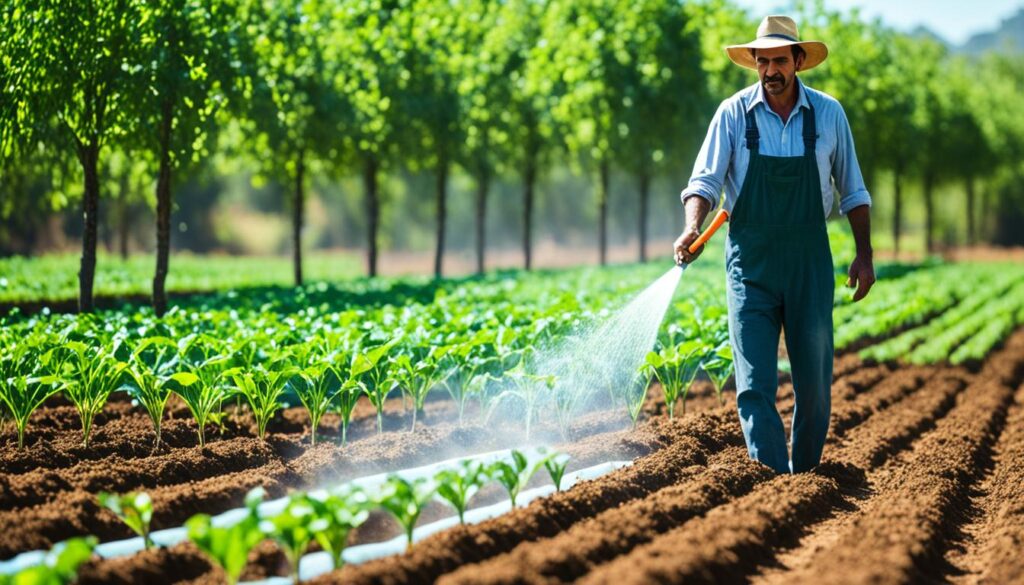
These sustainable practices save water and help your farm last longer. They show you care for the environment, drawing in customers who want to support green farms.
“Sustainable farming is not just about productivity; it’s about protecting the very resources that sustain us. Water conservation is a critical component of this holistic approach.”
Exploring water-saving methods can greatly benefit your farm, community, and the planet. By focusing on water conservation, you protect your land and lead the way to a greener future in farming.
Community Support: Fostering Local Connections
Being an organic farmer means more than just growing healthy crops. It’s about building strong ties with your community. These connections are key to your farm’s success and growth. By working with consumers and supporting farm-to-table projects, you can grow your brand, reach new markets, and get top prices for your products.
Engage with Consumers and Promote Farm-to-Table Initiatives
Connecting directly with your community highlights the perks of organic farming. Host events like u-pick days or farm tours to let people see your farm’s beauty and health. These events teach people about organic farming’s benefits and show the effort behind bringing fresh produce to their plates.
- Invite local families to explore your organic farm and learn about sustainable farming practices.
- Join farmers’ markets, CSAs, and direct sales to meet your community face-to-face.
- Work with local chefs and restaurants to highlight the quality and taste of your organic crops through farm-to-table projects.
Creating these strong bonds helps you charge more for your organic products. It also boosts your community’s health. As more people learn about organic farming’s perks, your efforts to connect and educate will benefit both your business and the planet.
“Organic farming is not just about growing food – it’s about building a sustainable future, one connection at a time.”
Certification and Labeling: Ensuring Transparency and Trust
As an organic farmer, building trust with your customers is key. Organic certification and labeling help lay that foundation. Getting the organic seal shows you’re serious about sustainable farming. This not only helps the environment but also attracts health-conscious buyers looking for top-quality produce.
The organic certification process checks that your farming meets strict standards. This includes avoiding synthetic pesticides, fertilizers, and genetically modified organisms. This ensures your customers trust your products. It also lets you charge more for your organic produce, making your farm more financially stable.
Labels on your products are also crucial. They should clearly show your organic methods and any certifications you’ve earned. This helps your customers make better choices. It builds trust and loyalty, as they support a farming way that matches their values and health goals.
